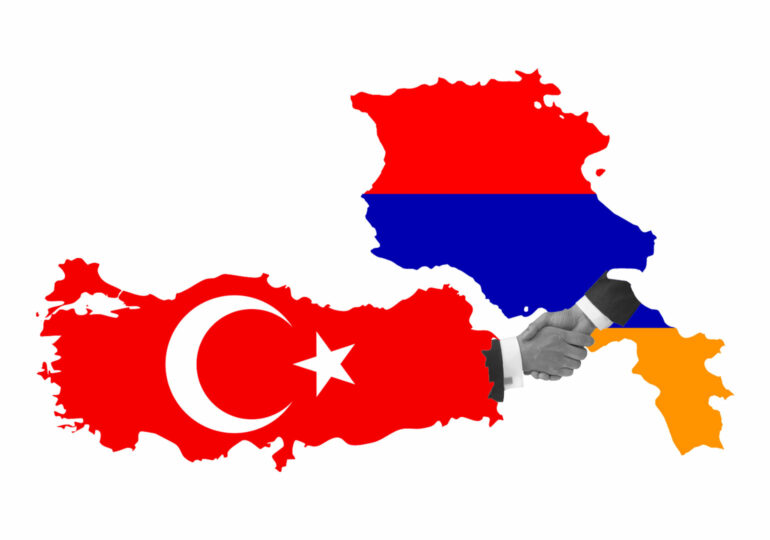On March 12, Turkish Foreign Minister Mevlüt Çavuşoğlu and Armenian Foreign Minister Ararat Mirzoyan held a meeting in Antalya, Turkey, where the two sides agreed to move forward with efforts to establish diplomatic relations “without conditions” between Turkey and Armenia and continue normalisation efforts that could lead to the reopening of their shared borders for trade.
Turkey and Armenia briefly enjoyed diplomatic relations after Yerevan gained its independence following the collapse of the Soviet Union. Yet the relationship was short-lived. Turkey closed its border with Armenia in 1993, during the first war in Nagorno-Karabakh. Since then, relations between the two countries have been non-existent for the past three decades, mainly due to Turkey’s constant refusal to recognise the mass killings of Armenians by Turks during the First World War as genocide. Ankara’s support for Azerbaijan in the first Nagorno-Karabakh War also significantly impacted. In 1993, Turkey closed the border in response to Armenia’s capture of the territories surrounding Nagorno-Karabakh.
The first attempt to re-establish diplomatic relations were made in 2009 when Turkey and Yerevan signed the so-called “Zurich Protocols”, which was brokered by Switzerland. However, the two countries’ parliaments never ratified the agreement due to the lack of readiness on either side to re-establish mutual trust. Another critical factor was Azerbaijan’s dissatisfaction with the normalisation process. It generated serious concerns in Baku – Turkey’s ally – and as a result, Baku used all the levers at its disposal to derail the process. The Azerbaijani government feared that if Armenia obtained an improved geopolitical position in the region, it would have been less willing to compromise on Nagorno-Karabakh and its surrounding districts. As a result, relations between Armenia and Turkey largely remained severed.
Nevertheless, since last year’s war between Armenia and Azerbaijan in Nagorno-Karabakh, much in the region changed, making the renewed push for normalising relations between Ankara and Yerevan more likely than ever before. The first positive signals were exchanged between Ankara and Yerevan in summer 2021 when Armenian Prime Minister Nikol Pashinyan made the somewhat surprising announcement that his government was prepared to normalise relations with Turkey following “signals” from Ankara. The Armenian parliament has also approved a five-year action plan “to make efforts to normalise relations with Turkey for the sake of stability, security, and the region’s economic development.” Yerevan even allowed Turkish Airlines flights to the Azeri capital Baku to use Armenian airspace as a sign of goodwill. Pashinyan’s announcement followed a seemingly positive statement by Turkish President Recep Tayyip Erdogan, who on August 29 expressed his willingness to “take the necessary steps” to begin thawing Ankara’s relationship with Yerevan. In December 2021, the two nations decided to appoint special envoys to further the normalisation of relations, while in January, the Armenian government lifted its embargo on Turkish goods.
The outcome of the 44-day war in Karabakh dramatically changed the realities in the region. Azerbaijan managed to regain control over a considerable part of Nagorno Karabakh. As a result, victorious Baku does not see Turkey’s overtures to Armenia as a threat. In 2009, Azerbaijan opposed the normalisation of the relationship between Armenia and Turkey primarily because Armenia continued to occupy Nagorno-Karabakh, internationally recognised as part of the Azerbaijani territory. The favourable outcome of the war for Azerbaijan, however, in which Turkish military support played a decisive role, decreases the possibility of Baku’s possible disapproval this time around. The Karabakh issue is almost settled, and Turkey did more for Baku than expected. There is no reason why Azerbaijan should perceive the Armenia-Turkey normalisation process as a threat. Moreover, The Azerbaijani side is interested in the normalisation of relations with Armenia and between Turkey and Armenia. Armenian Prime Minister Nikol Pashinyan and Azerbaijan’s President Ilham Aliyev have been set for taking steps towards reconciliation, and sustainable peace between the two countries and have already held a series of talks under Russian and, to a lesser extent, EU mediation. The principal interest lies in the revitalisation of the so-called Zangezur Corridor between Azerbaijan and Turkey and its exclave Nakhchivan. The corridor would also boost the region’s transit importance, especially when the West isolates Russia and the South Caucasus has a real opportunity to become a transit hub between Europe and Asia.
There is a great deal on the table not only for Azerbaijan but also for Armenia and Turkey. The opening of the 300-kilometre-long border could provide Armenia with new transportation opportunities and economic and trade benefits. For Armenia, an open border with Turkey would offer it a way to overcome its regional isolation and marginalisation. Still, it could also serve as a bridge for leveraging its membership in the Eurasian Economic Union. For Turkey, the normalisation of ties with Armenia is pivotal as it would boost Turkey’s increasing presence in the South Caucasus and create a better connection with Azerbaijan. Despite active engagement in the war, Turkey was not (officially at least) part of the ceasefire agreement. Moreover, while Russia’s position has substantially strengthened in the region through extensive deployment of peacekeepers, the Turkish presence is limited to surveillance drone operators in Azerbaijan, based in a joint Russian-Turkish military facility. New transport and economic links could change this and even counter Russian geopolitical influence in the region.
Despite positive changes, there are several factors that could hinder the normalisation process. Border clashes between Armenia and Azerbaijan were recurring issues in 2021 and resulted in casualties. Even though border clashes have not taken place this year, the situation around Nagorno-Karabakh remains fragile. Armenia and Azerbaijan still have to delimitate and demarcate the border, an issue that remains the central topic of dispute. This can easily deter the normalisation process between Armenia and Turkey. At the same time, there is public mistrust towards Azerbaijan in Armenia primarily due to the unfavourable outcome of the war. Given Turkey’s extensive support for Azerbaijan during the Second Karabakh War, encouraging trust at the societal level will likely prove difficult. Unconditional normalisation might be perceived as a “betrayal” of Armenian interests. The Armenian government might find it hard to convince the public that normalisation of relations does not imply giving up on Armenian interests.

















